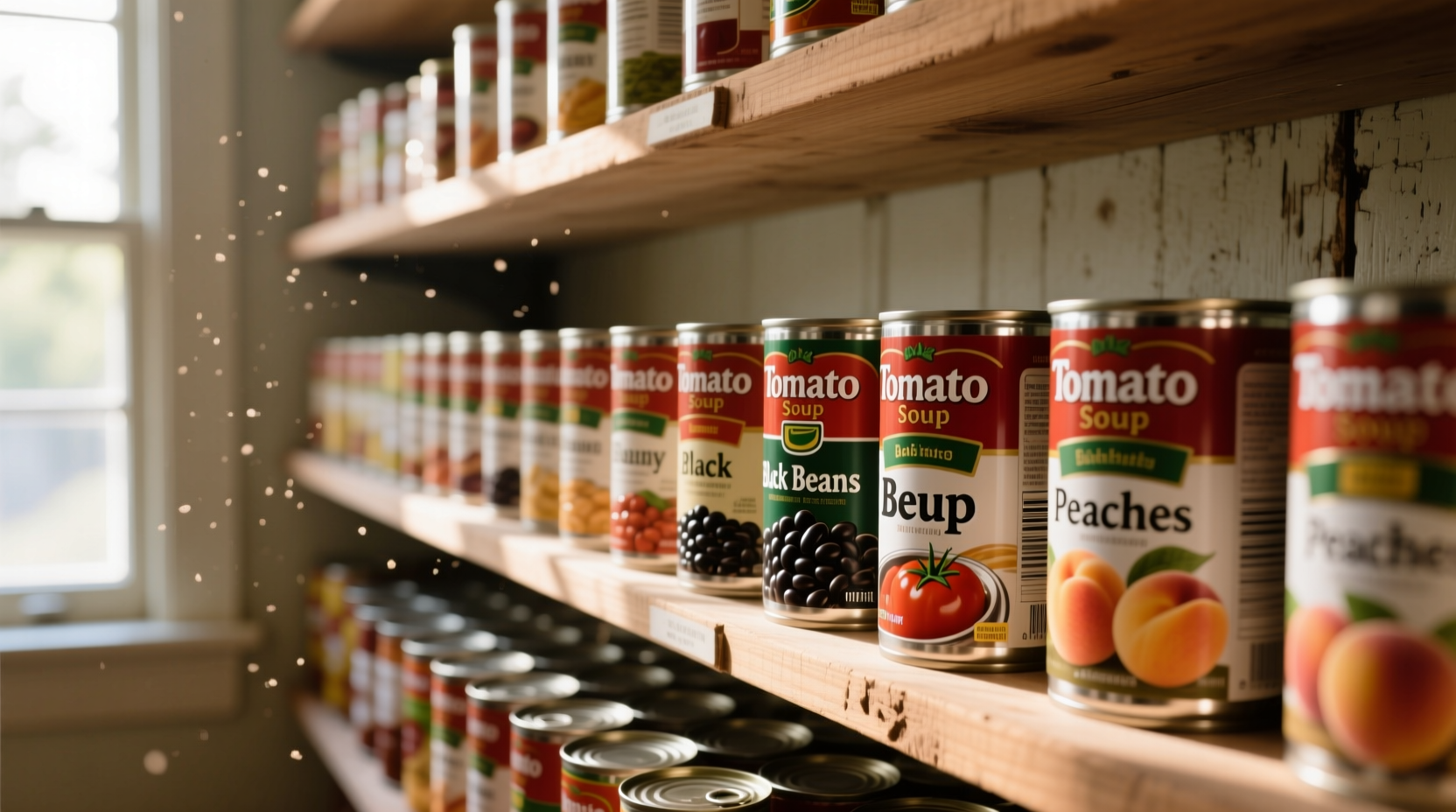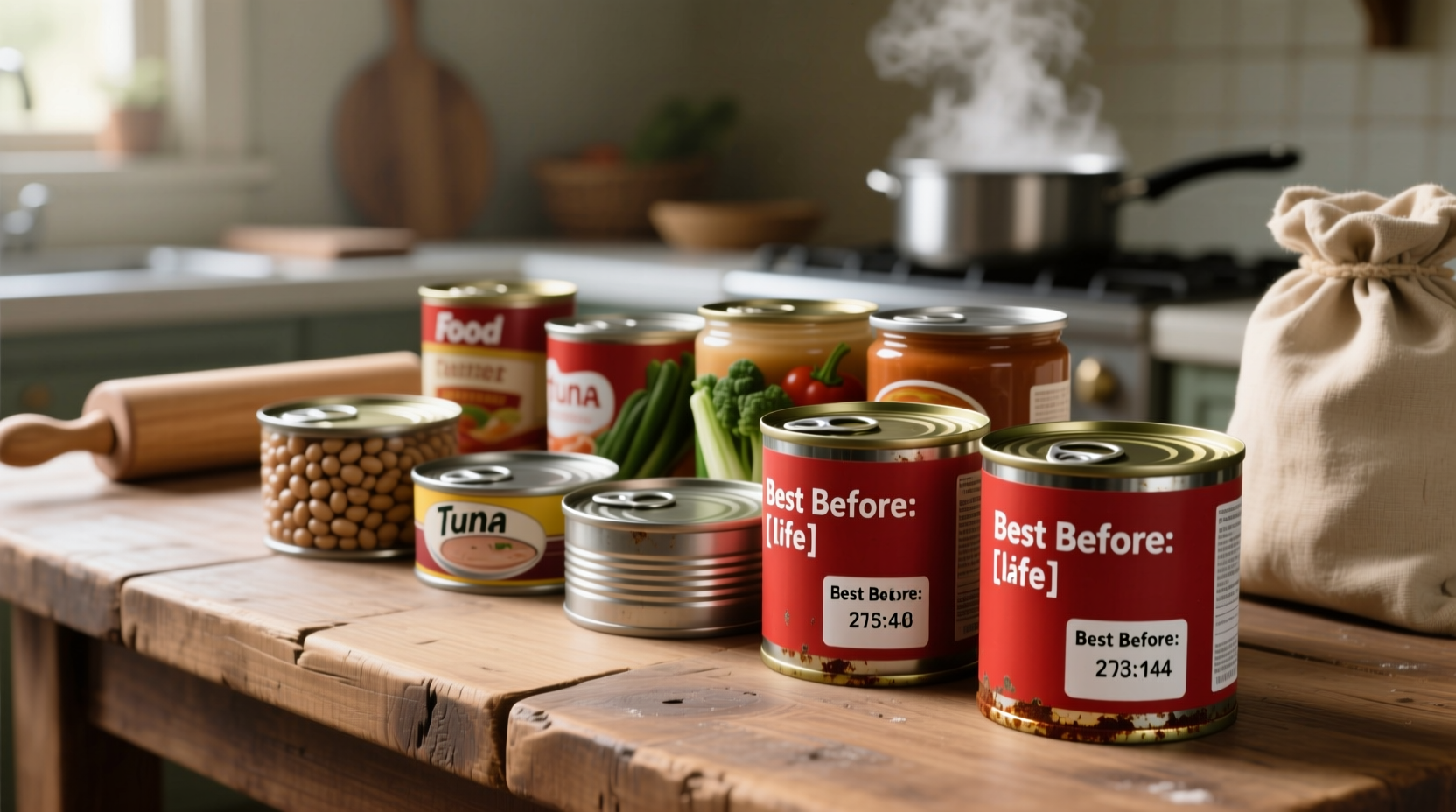Properly stored canned food remains safe to eat indefinitely, but quality peaks within 2-5 years depending on food type. High-acid foods like tomatoes and fruits maintain best quality for 12-18 months, while low-acid foods including meats and vegetables last 2-5 years. Never consume food from cans showing bulging, leaks, or severe dents at seams—these indicate potential spoilage and safety risks.
Why Canned Food Lasts So Long (And When It Doesn't)
Understanding canned food shelf life begins with the science of preservation. The canning process involves heating food to destroy microorganisms and sealing it in airtight containers, creating an environment where bacteria cannot grow. This makes properly canned food technically safe forever—but quality degrades over time.
The USDA Food Safety and Inspection Service confirms that "as long as the can is in good condition and has been stored properly, the canned food is safe to eat indefinitely." However, flavor, texture, and nutritional value diminish gradually. Your actual experience with canned goods depends on multiple factors we'll explore below.
How to Determine Canned Food Shelf Life by Type
Not all canned foods share the same shelf life. Acidity level plays a critical role in determining how long each type maintains quality. Here's what authoritative sources tell us:
| Food Category | Best Quality Period | Maximum Safe Period | Key Quality Indicators |
|---|---|---|---|
| High-Acid Foods (tomatoes, fruits, pickles) | 12-18 months | Up to 2 years | Color fading, flavor changes |
| Low-Acid Foods (meats, vegetables, soups) | 2-5 years | Indefinitely if sealed | Nutrient loss, texture changes |
| Canned Fish (tuna, salmon) | 3-5 years | Indefinitely if sealed | Oil separation, flavor changes |
| Condiments (ketchup, mustard) | 1-2 years unopened | 6-9 months after opening | Color changes, separation |
This data aligns with guidelines from the USDA Food Safety and Inspection Service and the National Center for Home Food Preservation. The "maximum safe period" assumes perfect storage conditions—any damage to the can significantly reduces this timeframe.
Storage Conditions That Make or Break Shelf Life
Where you store canned goods dramatically impacts their longevity. Temperature fluctuations, humidity, and light exposure all accelerate quality degradation. Consider these critical storage boundaries:
- Ideal temperature: Store cans between 50-70°F (10-21°C)—never above 75°F (24°C)
- Location matters: Avoid garages, attics, or under sinks where temperature and humidity fluctuate
- Positioning: Store cans upright, not on their sides, to prevent seal compromise
- Rotation system: Use the "first in, first out" method to consume older cans first
Research from University of Minnesota Extension shows that canned foods stored at 100°F lose half their nutrient value in just 3 months, while those stored at 70°F retain quality for 2 years or more. This dramatic difference underscores why storage location isn't just about convenience—it directly determines your food's shelf life.

When Canned Food Becomes Unsafe: Critical Warning Signs
While canned food rarely becomes unsafe if the container remains intact, certain conditions require immediate disposal. Recognizing these danger signs could prevent foodborne illness:
Never Consume Canned Food If You Notice:
- Bulging lids or cans—indicates gas production from bacterial growth
- Leaking or corroded cans—compromised seals allow contamination
- Severe dents, especially at seams—may create microscopic holes
- Springs when opening—pressure buildup indicates spoilage
- Off odors or appearance—cloudy liquid, mold, or unnatural colors
The FDA specifically warns that even a small dent on the seam of a can can create an entry point for bacteria. When in doubt, throw it out—no canned food is worth risking botulism poisoning.
Emergency Situations: Power Outages and Natural Disasters
During emergencies when refrigeration fails, canned food becomes crucial—but understanding its limitations matters. Most canned goods don't require refrigeration, but once opened, they follow standard perishable food rules.
Emergency management experts from Ready.gov recommend maintaining a 2-week supply of non-perishable food, with canned goods forming the backbone of this supply. Rotate these emergency supplies every 6-12 months to ensure optimal quality when needed most.
Common Myths About Canned Food Expiration Debunked
Several persistent myths cause unnecessary food waste. Let's clarify the facts:
- "Best by" dates = expiration dates: These indicate peak quality, not safety deadlines. Properly stored canned food remains safe beyond these dates.
- All dents make food unsafe: Only severe dents at seams compromise safety. Minor dents on the body are generally safe.
- Canned food loses all nutrition: While some vitamins degrade, canned foods retain most nutrients, sometimes exceeding fresh counterparts due to processing.
- Home-canned food follows the same rules: Commercially canned food has stricter safety standards than home-canned. Home-canned goods typically last 12-18 months.
Practical Tips for Maximizing Canned Food Quality
Extend your canned food's shelf life with these professional techniques:
- Wipe can exteriors before storage to remove dust and residue
- Use a permanent marker to note purchase date on cans
- Store in dark spaces—light accelerates nutrient degradation
- Keep cans away from heat sources like stoves or heaters
- Check stored cans quarterly for any signs of damage
Food scientists at the Penn State Extension confirm that following these simple practices can extend quality by up to 50% beyond standard recommendations. The key is consistency—regular monitoring prevents small issues from becoming food safety risks.
When Canned Food Quality Degrades (But Remains Safe)
Sometimes canned food passes its peak quality period but remains safe to eat. Recognize these quality changes that don't indicate spoilage:
- Slight darkening of fruits and vegetables
- Texture becoming softer than fresh counterparts
- Subtle flavor changes (less vibrant, slightly metallic)
- Minor separation of liquids in soups or sauces
These changes affect enjoyment but not safety. Simply drain liquids, rinse contents, or incorporate into recipes with stronger flavors to compensate for quality degradation.
Emergency Food Supplies: Planning for Long-Term Storage
For those building emergency food supplies, understanding canned food's evolution helps make informed choices. Modern canning technology has significantly improved shelf stability compared to older methods:
- Pre-1990s: Tin-plated steel cans prone to rust and corrosion
- 1990s-2000s: Introduction of epoxy linings reduced metal leaching
- Today: BPA-free linings and improved sealing technology enhance safety
This timeline matters because older canned goods (particularly those from before 2000) may have shorter effective shelf lives than modern equivalents due to less advanced packaging technology.
FAQ: Your Canned Food Shelf Life Questions Answered
Can canned food really last 10+ years?
Yes, properly stored canned food remains safe indefinitely according to USDA guidelines. While quality peaks within 2-5 years, food from cans stored for decades has been found safe when the container remains undamaged. The famous 1934 expedition that discovered century-old canned food from the Franklin expedition was still safe to eat, though quality had significantly degraded.
How can I tell if canned food has gone bad without opening it?
Check for visible warning signs: bulging lids or cans, leaks, severe dents (especially at seams), or rust that penetrates through the can. If the can spurts liquid or foam when opened, shows unnatural discoloration, or has an off odor, discard it immediately. Never taste food to determine safety—botulism toxin has no flavor.
Does freezing canned food extend its shelf life?
No, freezing canned food can actually reduce safety. If liquid inside expands during freezing, it may compromise the seal. Additionally, temperature fluctuations between freezing and thawing accelerate quality degradation. Store canned goods in a consistently cool, dry place instead of subjecting them to temperature extremes.
What's the difference between "best by" and "expiration" dates on cans?
"Best by" dates indicate when food is at peak quality, not when it becomes unsafe. Canned food remains safe beyond this date if stored properly and the container is undamaged. "Expiration" dates rarely appear on canned goods—when they do, they're typically for products with additional perishable ingredients like dairy.











 浙公网安备
33010002000092号
浙公网安备
33010002000092号 浙B2-20120091-4
浙B2-20120091-4